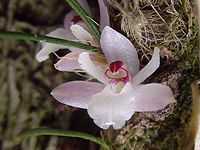Isabelia: Difference between revisions
Jump to navigation
Jump to search

imported>Dalton Holland Baptista (New page: {{subpages}} {{taxobox | name = ''Leptotes'' | color =lightgreen | image =Isabelia virginalis.jpg | image_caption = ''Isabelia virginalis'' | domain = Eukaryota | regnum = Plantae ...) |
imported>Dalton Holland Baptista No edit summary |
||
| Line 30: | Line 30: | ||
*''×Isanitella''<small> [[Leinig]] 1971</small> | *''×Isanitella''<small> [[Leinig]] 1971</small> | ||
}} | }} | ||
'''''Isabelia''''' is an [[orchid]] genus formed by three tiny species and one natural hybrid, spread from Northeast of [[Brazil]] to [[Argentina]], which are closely related to the genus ''[[Constantia]]''. During more than a century ''Isabelia'' was a genus formed by just one species, however, around 1978, it was merged with genus ''Neolauchea'', also unispecific. In 2001, a third genus was added to it, ''Sophronitella''. | |||
==Distribution== | |||
==Description== | |||
==Taxonomic notes== | |||
==Species== | |||
*''[[Isabelia pulchella]]'' | |||
*''[[Isabelia violacea]]'' | |||
*''[[Isabelia virginalis]]'' | |||
*''[[Isabelia × pabstii]]'', a natural hybrid between ''I. violacea'' and ''I. pulchella''. | |||
==References== | |||
{{reflist|2}} | |||
Revision as of 16:54, 22 March 2009
| Leptotes | ||||||||||||||||||||
|---|---|---|---|---|---|---|---|---|---|---|---|---|---|---|---|---|---|---|---|---|
 Isabelia virginalis
| ||||||||||||||||||||
| Scientific classification | ||||||||||||||||||||
| ||||||||||||||||||||
| Type species | ||||||||||||||||||||
| Isabelia virginalis Barb. Rodr. 1877 | ||||||||||||||||||||
| Species | ||||||||||||||||||||
| ||||||||||||||||||||
| Synonym | ||||||||||||||||||||
Isabelia is an orchid genus formed by three tiny species and one natural hybrid, spread from Northeast of Brazil to Argentina, which are closely related to the genus Constantia. During more than a century Isabelia was a genus formed by just one species, however, around 1978, it was merged with genus Neolauchea, also unispecific. In 2001, a third genus was added to it, Sophronitella.
Distribution
Description
Taxonomic notes
Species
- Isabelia pulchella
- Isabelia violacea
- Isabelia virginalis
- Isabelia × pabstii, a natural hybrid between I. violacea and I. pulchella.